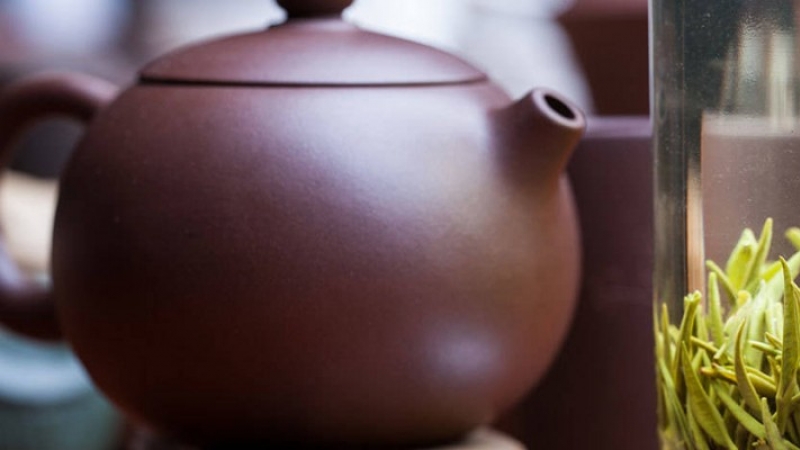The benefits of jasmine tea are manifold, including a reduced risk of heart attacks, a stronger immune system and the prevention of diabetes. Jasmine tea also helps prevent cancer, reduces stress, improves digestive processes and lowers cholesterol. It has also been found to eliminate harmful bacteria and relieve chronic inflammation such as muscle pain.

Jasmine tea is not a herbal tea, as it is actually normal tea (green, white, red or Oolong) that is flavoured with jasmine flowers to create a unique scent and flavour.
History of jasmine tea
As we know, China has a long and renowned history with tea, and jasmine is one of the most popular types of tea to emerge from this ancient nation.
Jasmine tea first appeared in official records during the Song dynasty, which ended in the 13th century B.C., but at that time, it was mainly reserved for royalty. Jasmine tea may have originally come from Persia, via India, along with the cultural export of Buddhism to China. In later dynasties, jasmine tea became a common export product in the western world, and remains very popular today.
Tea can be brewed in a variety of ways, varying in intensity and grade.
Some are produced as loose leaf teas, while others are cut and bagged. Some are rolled or tied in different shapes, such as the common ‘Jasmine Pearl’, usually from two tea buds and a leaf. All variable types, regardless of shape, must be scented before becoming ‘jasmine tea’.
There are numerous methods of doing this; from simple physical blending, to complex air filtering and blending of the aroma for a pure, light taste. Creating delicious and effective jasmine tea is truly an art in itself.
Jasmine tea extract can also be added to beverages to achieve the healthy effects of tea, without having to infuse it. One reason why jasmine tea is so popular is because of its many health benefits, which come from the nutrients contained in the buds themselves.
Jasmine tea is a wonderful way to add some rare antioxidants to your system, such as catechins and epi-catechins, which can have a wide range of beneficial effects on your system.

Beneficial effects of jasmine tea
Antioxidant properties
Perhaps the most praised aspect of jasmine tea is the high level of antioxidants contained in this delicate and delicious drink.
The most well-known antioxidants found in this type of tea are catechins. Green tea is the most commonly used base for jasmine tea, but depending on which type of tea is used as a base, different antioxidant properties may be present.
For example, red tea has high levels of theaflavins, while green tea has high levels of catechins, but they have very similar effects on the body. Antioxidants work within the body to seek out and destroy harmful agents or free radicals that can cause illness and compromise the immune system.
Catechins, as mentioned above, are the antioxidants that jasmine tea drinkers are most looking for, as they have been shown to be instrumental in preventing some serious ailments in the body.
Cardiovascular health
For those with a personal or family history of cardiovascular problems, consuming teas such as jasmine tea can be a great help in preventing further ailments. Catechins found in many types of tea have been shown to have a key factor in inhibiting LDL oxidation, which occurs when bad cholesterol in your arteries becomes inflamed after being oxidised. This inflammation in the veins and arteries can lead to heart attacks or strokes. The catechins found in jasmine tea inhibit this oxidation process, so blood pressure and cholesterol levels fall, and long-term threats such as heart disease can be prevented.
Helps control diabetes
In the fight against diabetes, jasmine tea has proven to be a valuable tool. Drinking jasmine/green tea can reverse the negative effects that diabetes has on certain serum proteins, working as a regulator for people with diabetes, and as a preventative measure for those who have not been diagnosed but who still consume jasmine tea as a regular part of their daily or weekly health regime.
The ability to metabolise glucose is the fundamental mechanism that determines the condition of diabetics, so regulatory agents such as jasmine tea can be very useful in preventing or treating the disease.
Against stress
The olfactory system is something we often overlook, but it can be a very powerful sense, and studies have shown that the smell of jasmine can be very helpful or relaxing for certain test subjects.
Those test subjects who have a natural predilection for the smell of jasmine have a parasympathetic response to the odour, and their bodies release chemicals that allow them to relax or improve their mood naturally.
However, the smell of jasmine is what some call an ‘acquired taste’, and studies have shown that people who do not like the smell of jasmine may actually become more anxious when exposed to it at high intensity.
Gastrointestinal disorders
Adding jasmine tea to your regular diet can improve your chances of having a healthy stomach and digesting all your food.
As mentioned earlier, green tea, and therefore most types of jasmine tea, is rich in powerful antioxidants called catechins. These have effects on several areas of health, including the gastrointestinal system. They activate a number of intracellular antioxidants and interact well with gastrointestinal enzymes to promote healthy bowel function.
Drinking green tea and jasmine tea can reduce intestinal abnormalities and various diseases.
Immune system
The many benefits of drinking jasmine tea extend to improving the resistance of the immune system. Many forms of cancer and cancerous diseases can have an immunosuppressive effect, which means that the body’s overall immune system is compromised, making the body vulnerable to many more pathogens.
Jasmine tea has been shown to protect the immune systems of frequent users due to its anti-inflammatory and antioxidant properties. The immune system is the first line of defence against all kinds of diseases, so strengthening the system can benefit the body in countless ways.
Joint pain
One of the other positive effects of this type of tea is the reduction of chronic discomfort associated with joint pain and arthritis. The anti-inflammatory nature of certain organic elements in jasmine tea may reduce joint swelling and inflammation by inhibiting unwanted cellular oxygenation.
This can mean a reduction or elimination of these conditions if a regular amount of jasmine tea is introduced into a person’s diet!
Weight loss
Everyone is looking for the secret to reducing their weight easily and quickly, and jasmine tea can be a good addition to any diet as a weight loss aid.
The antioxidant properties of this tea help speed up metabolism, and this increase in metabolic efficiency makes training more effective and helps your body process nutrients faster.
A faster or more efficient metabolism helps in weight loss, but jasmine tea should be used in addition to other weight loss techniques, as a complementary element, not as a stand-alone solution.
Anti-inflammatory properties
Jasmine tea can provide a defence against bacterial infections. Jasmine tea is an unexpected antibiotic that you can safely add to your diet.
Studies have shown that in some test subjects, the properties of jasmine oil can eliminate the effects of E. coli, which can be a very dangerous bacteria commonly found in poorly stored food or food cooked in unhygienic conditions. Jasmine tea can also provide relief for coughs, colds and throat infections.
Care must be taken if…
Pregnancy
Although many aromatherapy techniques are popular during pregnancy, the strong odours and chemicals in jasmine tea are not recommended during pregnancy.
There have been cases where the use of jasmine tea or jasmine essential oil (sometimes used to make jasmine tea) has caused premature contractions in pregnant women. Consult your doctor about any use of aromatherapy or foods involving these olfactory elements before adding them to your diet.
Intestinal disorders
Many people choose to use jasmine tea to boost their metabolism, or even as a training aid to stimulate additional weight loss, but jasmine tea is very acidic, so consuming it on an empty stomach to stimulate weight loss or metabolic function may cause intestinal pain or discomfort.
Caffeine
Despite its relaxing and mood-altering properties, jasmine tea is a source of caffeine, a stimulant that affects people in different ways. Caffeine is meant to block certain neurotransmitters in the brain that cause the feelings of alertness or energy that most people want from caffeine.
However, some people are very sensitive to the effects of caffeine, particularly in large doses. Consult your doctor or use your experience with other caffeine-containing products before adding jasmine tea to your diet, or possibly purchase a caffeine-free version of jasmine tea.
Discover delicious Jasmine Tea recipes: Smoked Jasmine Tea Trout with Spelt and Wasabi Sauce and Chinese Jasmine Green Tea Asparagus.



